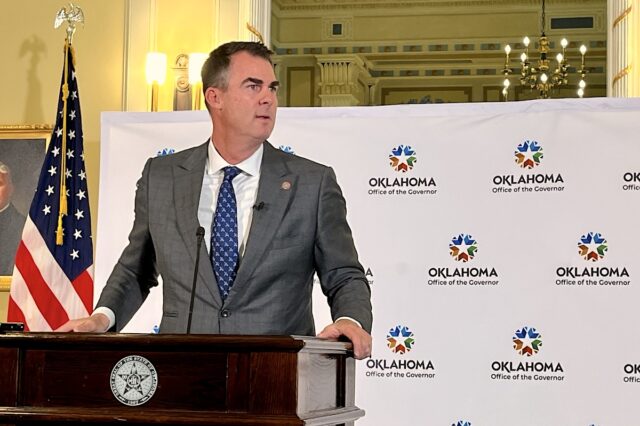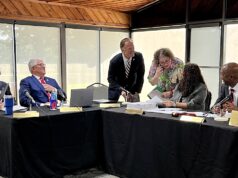
Gov. Kevin Stitt has allowed the Oklahoma Legislature’s budget bills become law without his signature. Although he released a statement outlining frustrations with how much money lawmakers appropriated, Stitt’s decision stands somewhat in contrast to his prior vetoes of budgets sent to him by lawmakers.
In his statement, Stitt opened by referencing the general appropriations bill sending money to dozens of state agencies.
“Through House Bill 1004X, the Legislature has spent 12.96 billion dollars in taxpayer money. The problem is that the Legislature has relied upon one-time revenue to support recurring expenditures that exceed recurring revenues by roughly $220 million,” Stitt said. “They have also drawn down the state’s savings from about $6.2 billion to $4.2 billion. Because this approach is neither sustainable nor fiscally wise, I have not signed House Bill 1004X. Nevertheless, subject to objections to the unique process by which the bill made its way to my desk, the bill will become law without signature.”
Earlier in the week, Stitt vetoed a pair of bills sent to him by lawmakers that attempt to extend state-tribal compacts on tobacco taxes and motor vehicle registration:
- HB 1005X extends state compacts with tribal nations regarding motor vehicle registration fees through Dec. 31, 2024;
- SB 26X extends state compacts with tribal nations regarding tobacco taxes through Dec. 31, 2024. A prior effort to extend the compacts until January 2028 did not receive a Senate committee hearing.
Stitt expressed concerns that lawmakers were “circumventing” his authority to negotiate compacts with sovereign tribal nations. Tribal leaders, in response, criticized Stitt for having “personal hostility” toward tribes.
“Significant majorities in both chambers of the Legislature voted to extend tobacco and vehicle compacts for one year because they provide important, ongoing benefits for the people of Oklahoma,” said Choctaw Nation Chief Gary Batton. “By vetoing these bills, Gov. Stitt has once again put his personal hostility to tribal sovereignty ahead of what is good for the state and what is good for the tribes. We hope the Legislature will return as expected in June and will override these vetoes to show their continuing support for positive, cooperative relations between the state and tribes.”
Budget bills signed by the governor
With the exception of a major education deal approved earlier in May, lawmakers passed the bulk of their budget in a concurrent special session called to ensure they would have enough time to consider overriding any of the governor’s potential vetoes. Lawmakers have tentatively set a date of Monday, June 12, for returning. The pair of tribal compact bills vetoed by Stitt passed both chambers with the supermajorities that would be necessary to push them into law despite the governor’s objections.
Despite Stitt’s stated affinity for tax reductions, he also let a pair of tax cut bills become law without his signature. The bills are estimated to have a nearly $70 million impact on future revenues:
- HB 1040X, which modifies a tax bracket for joint filers in an effort not to have a “penalty” for marriage. The change is estimated to reduce state collections by about $14.7 million annually;
- HB 1039X, which eliminates the state franchise tax on businesses starting in the 2024 tax year. The move is estimated to reduce state revenues and save businesses about $55 million annually.
Stitt has floated the notion of calling a different special session to encourage lawmakers to pass tax cuts he has championed over the past two years. Stitt called such a special session for tax cuts last summer while running for reelection, but the Senate declined to hear the bills advanced by the House.
“I’m considering calling people back for another special session to get a tax cut done,” Stitt said during a May 26 press conference. “The fact we were not able to get that done to me is just unbelievable.”
Later that day, a pair of bills in the Legislature’s budget package failed passage in the Senate. HB 1022X, to create a new “judicial performance evaluation” process, failed 15-29, and HB 1026X, to raise statewide official pay following the next election, failed 13-31.
In response to the Senate’s votes, House members chose not to hear three bills that same day:
- SB 11 to turn the Tourism and Recreation Commission back into a governing body;
- SB 22 to establish a fund and rules for the Oklahoma Museum of Popular Culture to receive $18 million contingent on matched fundraising; and
- SB 27 to direct $12.5 million to the County Community Safety Investment Fund, which was created to reallocate criminal justice reform savings to community mental health efforts in line with State Question 781.
“SB 22X and SB 27X were part of the budget deal, along with HB 1022X and HB 1026X that [the Senate] failed,” said House Appropriations and Budget Chairman Kevin Wallace (R-Wellston) after adjournment May 26. “We’re waiting on the Senate to uphold their end of the budget deal.”
Asked his reaction to the Senate voting down the two bills, Wallace said, “It’s par for the Senate.”
“They didn’t hear all the bills last year as well. This year they kill two bills, capture them and don’t bring them back up,” Wallace said. “It is interesting to me that this week the Senate wanted to (…) extend special session to June 30 but still come in on June 12. I think I’m starting to understand why.”
Asked if he had any comment about how the budget bills were handled, Senate Appropriations and Budget Chairman Roger Thompson (R-Okemah) spoke in general terms.
“All in all, I believe that it is a good year for the people of Oklahoma,” Thompson said. “I was honored to be a small part of the process.”
FY 2024 budget overview
Among the largest single investments in non-education matters is a $215 million appropriation for three new programs aimed at incentivizing affordable housing construction across the state.
HB 1031X creates the Oklahoma Housing Stability Program, the Homebuilder Program, and the Oklahoma Increased Housing Program. The bill directs the Oklahoma Housing Finance Agency to administer the programs and promulgate rules. The Homebuilder Program authorizes loans as low as zero percent for homebuilders of single-family units. The Increased Housing Program allows developers to apply for “gap financing” for single-family and multifamily housing projects. It also allows homebuyers to apply for a grant to assist with making a down payment on a home. The bill specifies that all three programs be applied in rural and urban areas and that preferences be provided to areas previously declared federal disaster zones.
The other largest one-time investment in the Legislature’s FY 2024 budget stemmed from a compromise over ideas floated by the House and Senate.
HB 1002X would create the Legacy Capital Financing Act and Fund “to facilitate advanced financing for current and future capital needs of the state’s agencies, departments, and subdivisions to enable, maintain, or improve the performance of the duties and missions assigned to such entities benefiting the health, safety, and welfare of the citizens of Oklahoma.”
In the general appropriations bill, lawmakers specified an initial deposit of $600 million for the Legacy Capital Financing Fund. Lawmakers are immediately using nearly $351 million of that money to finance state agency capital projects that would otherwise hit a bond market with rising interest rates. The projects are outlined in six other bills:
- HB 1009X authorizes the Oklahoma Capital Improvement Authority to dedicate $46 million from the Legacy Capital Financing Fund “for the benefit of Oklahoma Historical Society to facilitate the construction, repair and rehabilitation, and improvements to real and personal property related to existing Oklahoma Historical Society facilities.”
- HB 1011X authorizes the Oklahoma Capital Improvement Authority to dedicate $70 million from the Legacy Capital Financing Fund to the “Office of Management and Enterprise Services to repair, refurbish, and improve the real and personal property of the Jim Thorpe Office Building.” The bill also dedicates $19 million to OMES “to repair, refurbish, and improve the real and personal property constituting the tunnels underlying the State Capitol Office Complex and associated fixtures and equipment.” The bill also dedicates $26.3 million to OMES “to accept transfer of the Kelley Building and Kelley Annex owned by the Department of Human Services and renovate the facilities for lease to a public operator as a day care facility.” The bill also repeals previously authorized bonding authority for those projects.
- HB 1012X authorizes the Oklahoma Capital Improvement Authority to utilize money from the Legacy Capital Financing Fund to fund three of Department of Public Safety projects: $20 million for the Oklahoma Wireless Information Network, $59.6 million for a centralized training facility and $8 million for Oklahoma Highway Patrol facility upgrades;
- HB 1013X authorizes the Oklahoma Capital Improvement Authority to dedicate $79 million from the Legacy Capital Financing Fund “for the benefit of” the Oklahoma State University Veterinary Medicine Authority, to “construct, refurbish or expand animal teaching hospitals and related facilities.” The bill notes that the OSU VMA was authorized in HB 2863, which Stitt vetoed on April 26;
- HB 1014X authorizes the Oklahoma Capital Improvement Authority to utilize $17.6 million from the Legacy Capital Financing Fund “to the Office of Management and Enterprise Services for the benefit of the Oklahoma Department of Libraries, to construct, refurbish, or expand the facilities utilized by the Department of Libraries;”
- HB 1032X authorizes the Oklahoma Capital Improvement Authority to dedicate $4 million from the Legacy Capital Financing Fund “to facilitate the construction of new or expanding training facilities” for the Council on Law Enforcement Education and Training.
Other budget bills that became law without Stitt’s signature this week are:
- SB 11X re-expands the duties of the Oklahoma Tourism and Recreation Commission from advisory to governance and allows for the governor to remove an appointee “with cause.” The Legislature had made the commission an advisory body in 2018, but the Swadley’s scandal and questions about agency spending spurred lawmakers to consider undoing their prior action;
- SB 12X modifies rules regarding the assessment and transport of people that a law enforcement officer reasonably believes needs mental health treatment. It removes a 30-mile minimum requirement for the Department of Mental Health and Substance Abuse Services or a contracted entity to transport the individual instead of law enforcement;
- SB 13X extends from 15 to 30 years the eligibility of sports teams — functionally, the Oklahoma City Thunder — to qualify for payments under the Oklahoma Quality Jobs Act;
- SB 14X doubles from $15 million to $30 million the Oklahoma Department of Commerce’s allowed cumulative inducements for “entertainment district tenant” parties that have a total spend of at least $1 million;
- SB 15X takes from $500 to $2,500 the annual fee charged on manufacturers of controlled dangerous substances, including marijuana grow operations;
- SB 16X establishes a six-week paid maternity leave program for state employees with at least two full years of service prior to the birth or adoption of a child;
- SB 17X extends for five years through 2029 a tax credit for entities owning railroads in Oklahoma;
- SB 18X creates the Medical Marijuana Tax Fund and removes prior apportionment language for use of marijuana tax revenues. The measure is part of a broader move to make the Oklahoma Medical Marijuana Authority a stand-alone agency outside of the State Department of Health;
- SB 19X creates the Family Representation and Advocacy Act and prescribes rules and requirements for “court-appointed legal and interdisciplinary representation to children, indigent parents, legal guardians, or Indian custodians in proceedings governed by the Oklahoma Children’s Code.”
- SB 21X creates the Oklahoma Employment Security Commission Information Technology Innovation Revolving Fund;
- SB 22X creates the Oklahoma Museum of Popular Culture Supplemental Revolving Fund and states that no expenditures from the fund may be made until $18 million of additional money is raised via private fundraising or appropriation from other governmental entities;
- SB 23X modifies provisions of the Ambulance Service Provider Access Payment Program to distinguish between fee-for-service contracts and capitated contracts. The change reportedly relates to air ambulance services;
- SB 24X creates the Oklahoma State Bureau of Investigation Centennial Revolving Fund to support the agency’s celebration of its centennial;
- SB 27X directs $12.5 million to the County Community Safety Investment Fund, which was created to reallocate criminal justice reform savings to community mental health efforts in line with State Question 781;
- SB 28X establishes budget limitations for the State Regents for Higher Education, including $17.4 million for the state’s scholarship program and teacher employment incentive program, $12.5 million for establishing a National Guard Educational Assistance Fund, $48.9 million for faculty pay raises, $20 million for expanding engineering programs, $5 million for application-based health care, $12.5 million for workforce development initiatives, $12.5 million for student success initiatives and $200,000 to establish a food pantry;
- SB 29X lowers a matching-rate requirement for an early childhood education pilot program — Educare — serving at-risk children administered by the State Department of Education;
- SB 31X establishes line-item funding requirements for the Oklahoma Historical Society, including $18 million for the Oklahoma Museum of Popular Culture and $5 million for the Native American Cultural and Educational Authority;
- SB 32X establishes line-item funding requirements within the budget of the Oklahoma Health Care Authority, including $30 million “to provide grant funding to providers for the one-time connection to the state designated entity for health information exchange.” The bill also directs $47.7 million be used to increase rates for long-term care facility care by $37 per day and rates for “intermediate care facilities for individuals with intellectual disabilities” by $17 per day. It directs $200 million to be used for one-time funding to critical access hospitals and hospitals that participate in the Supplemental Hospital Offset Payment Program (SHOPP). The bill also establishes new rules regarding the use and management of other funds by the Health Care Authority;
- SB 33X establishes line-item funding requirements within the budget of the Oklahoma Department of Human Services, including $10 million for home-based services for developmentally disabled individuals and $5.6 million for the Child Abuse Multidisciplinary Account. The bill also makes permanent through June 30, 2024, a $5 supplemental daily reimbursement rate for childcare providers;
- SB 34X functionally affirms a sales tax exemption for the purchase of broadband equipment;
- SB 35X directs the Tourism and Recreation Department to “make available matching funds to multicounty organizations” pursuant to state statute;
- SB 36X establishes budget limitations for the State Department of Education, including specifications for a school security assessment ($1.4 million), a software suite at the state agency ($2 million) and equipping all schools with inhalers ($250,000);
- SB 37X moves Service Oklahoma out from under the Office of Management and Enterprise Services to become a stand-alone agency. It refers to tag agents or motor license agents as “licensed operators” and establishes payment percentages to them. It provides for Service Oklahoma to make compensation changes for license agents annually before the last day of September;
- HB 1006X establishes line-item funding requirements within the budget of the Oklahoma Department of Agriculture, Food and Forestry;
- HB 1007X establishes line-item funding requirements within the budget of the Oklahoma Department of Commerce, including specific allocations to programs at Seminole State College (for a rural business and resource center), Murray State College (for a gunsmithing technology degree) and Northeastern A&M College (for an agriculture rodeo program);
- HB 1008X increases from $25,000 to $30,000 the maximum income cap for heads of household claiming a certain property tax homestead exemption;
- HB 1023X authorizes the Oklahoma Department of Environmental Quality to demolish its long-problematic parking garage at its Oklahoma City headquarters;
- HB 1025X increases from 50,000 to 75,000 the county population threshold for the Rural Economic Transportation Reliability and Optimization Fund. (A prior version of the bill drafted by the House proposed establishing seven priority projects, but negotiations with the Senate resulted in those projects — near Jay, Idabel and Hochatown — to be removed from the bill);
- HB 1029X creates the Caring for Caregivers Act, which establishes a new tax credit starting in the 2024 tax year for family members who act as caregivers for disabled Oklahomans who are age 62 and up and who live at a private residence. The bill allows for a tax credit up to 50 percent of eligible caregiver costs, capped at $2,000 per year for most participants and $3,000 per year for those caring for veterans or people dealing with dementia. The bill provides a flexible cap of $1.5 million total for the program annually, with adjusted calculations made in future years if a prior year exceeds that amount;
- HB 1030X creates the Oklahoma Accelerator Revolving Fund for the Oklahoma Center for the Advancement of Science and Technology.
- HB 1024X raises from $20 per day to $50 per day the rate paid to jurors in Oklahoma;
- HB 1027X modifies components of the full-time service calculation for state pensions involving judges and justices. It makes judicial branch employees eligible for the state’s longevity pay plan;
- HB 1028X modifies payments and conditions for the Workers Compensation Commission Revolving Fund;
Lawmakers appropriated millions of dollars of American Rescue Plan Act funding as well. Stitt also allowed each of those measures to become law without his signature:
- HB 1017X creates the “emergency relief and impacts grant program” within the Oklahoma Department of Emergency Management and Homeland Security, which will receive $25 million;
- HB 1018X appropriates $6.5 million to the Oklahoma Center for Advancement of Science & Technology for expanding three projects: 36 Degrees North ($5 million), The Verge OKC ($1 million) and an effort for rural entrepreneurial support ($1 million);
- HB 1019X appropriates $968,000 of ARPA funding to the Department of Commerce for the Workforce Coordination Revolving Fund utilization program, which aims to revise and improve the state workforce coordination program;
- HB 1020X appropriates $25 million of ARPA funding to the new fund at the Oklahoma Department of Emergency Management and Homeland Security created by HB 1017X;
- SB 38X appropriates $5 million of ARPA funds to the State Regents for Higher Education to support a Teachers Accelerated Program that will invest in the training of high-demand educator categories, such as English as a Second Language, math, science and special education. The program is also set to support micro-credentialing in educator fields;
- SB 39X appropriates $500,000 of ARPA funds to the Healthcare Workforce Training Commission for support and expansion of the Northwestern State University nursing program by purchasing equipment for instruction. The bill also implements other requirements on the commission;
- SB 40X appropriates $17.5 million of ARPA funding to the Department of Human Services to support nonprofits, including expansion of the Women in Recovery program into five additional counties ($10.3 million), ReMerge expansion into areas of rural Oklahoma ($3.8 million), capacity expansion at Special Care ($2.5 million) and capacity expansion at New Leaf Transition Academy ($1 million).
More details about overall appropriations in HB 1004X — the general appropriations bill — and other measures are included in a bill summary spreadsheet posted on the Legislature’s website.
(Correction: This article was updated at 11:56 p.m. Friday, June 2, to correct description of SB 32X.)





















